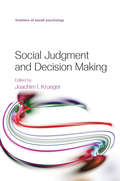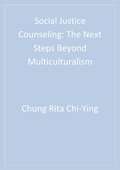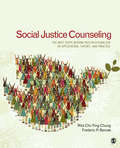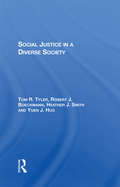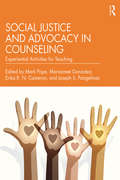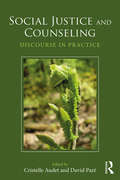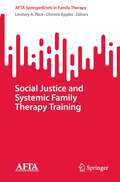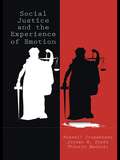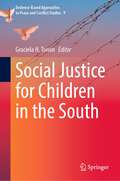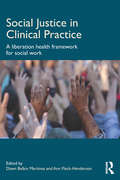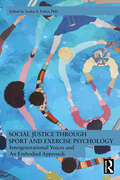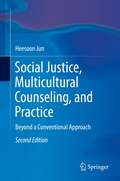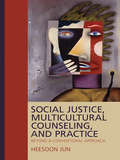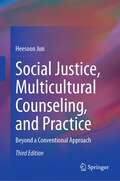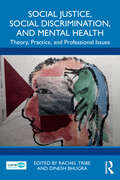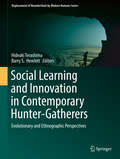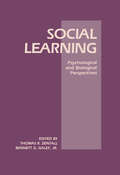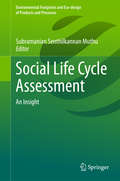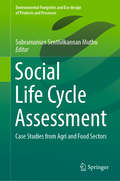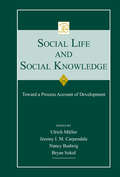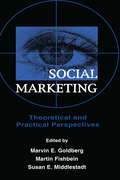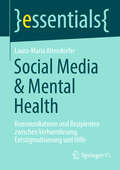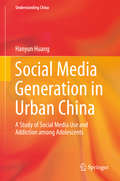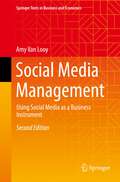- Table View
- List View
Social Judgment and Decision Making (Frontiers of Social Psychology)
by Joachim I. KruegerThis volume brings together classic key concepts and innovative theoretical ideas in the psychology of judgment and decision-making in social contexts. The chapters of the first section address the basic psychological processes underlying judgment and decision-making. The guiding question is "What information comes to mind and how is it transformed?" The second section poses the question of how social judgments and decisions are to be evaluated. The chapters in this section present new quantitative models that help separate various forms of accuracy and bias. The third section shows how judgments and decisions are shaped by ecological constraints. These chapters show how many seemingly complex configurations of social information are tractable by relatively simple statistical heuristics. The fourth section explores the relevance of research on judgment and decision making for specific tasks of personal or social relevance. These chapters explore how individuals can efficiently select mates, form and maintain friendship alliances, judiciously integrate their attitudes with those of a group, and help shape policies that are rational and morally sound. The book is intended as an essential resource for senior undergraduates, postgraduates, researchers, and practitioners.
Social Justice Counseling: The Next Steps Beyond Multiculturalism
by Rita Chi-Ying Chung Frederic P. BemakDirected mainly at higher education counselors and teachers for their curricula, this text focuses on applications, tools, and models of global issues in social justice counseling. Chung and Bemak (both in education and human development at George Mason U. ) offer unique perspectives on the changing issues of mental health in individuals whose race, ethnicity, class and environment often subject them to social injustices. Theories of multicultural counseling, human rights, relationship between power and justice, types of advocacy and goals to promote action are central to the text. Case studies and examples of various groups are presented. Annotation ©2011 Book News, Inc. , Portland, OR (booknews. com)
Social Justice Counseling: The Next Steps Beyond Multiculturalism
by Frederic P. Bemak Rita Chi-Ying ChungThis text develops a new frontier in multicultural social justice work and is the next step toward alleviating the injustices faced by individuals in society. Addressing issues of social class, race and ethnicity, and more, this book reflects the shift in recent years towards social justice counseling for all mental health professionals. It offers new and unique perspectives supplementing important social justice issues and enhancing the content taught in multicultural courses. The authors are leading authorities on multicultural and social justice counseling and have led the way to create a specialization with a nationally recognized program in multicultural social justice counseling.
Social Justice In A Diverse Society
by Tom Tyler Robert J Boeckmann Heather J Smith Yuen J HuoIssues of social justice have been an important part of social psychology since the explosion of psychological research that occurred during and after World War II. At that time, psychologists began to move away from earlier theories that paid little attention to people's subjective understanding of the world. As increasing attention was paid to people's thoughts about their social experiences, it was discovered that people are strongly affected by their assessments of what is just or fair in their dealings with others. This recognition has led to a broad range of studies exploring what people mean by justice and how it influences their thoughts, feelings, and behaviors.
Social Justice and Advocacy in Counseling: Experiential Activities for Teaching
by Mark Pope Mariaimeé Gonzalez Erika R.N. Cameron Joseph S. PangelinanSocial Justice and Advocacy in Counseling provides a thorough and up to date grounding in social justice and advocacy for counseling students and faculty. Chapters address issues of discrimination and oppression and their effect on individuals and cultural groups through a variety of activities and handouts related to each of the eight CACREP core standards. The book’s final section focuses on activities and handouts related to counseling specialties, including school, career, and addictions counseling. This book will help counselor educators increase student awareness, knowledge, and skills. For students, the practical activities bring the concept of social justice alive in important ways and will continue to be a handy reference as they develop their careers and promote access and equity.
Social Justice and Counseling: Discourse in Practice
by Cristelle Audet David PareSocial Justice and Counseling represents the intersection between therapy, counseling, and social justice. The international roster of contributing researchers and practitioners demonstrate how social justice unfolds, utterance by utterance, in conversations that attend to social inequities, power imbalances, systemic discrimination, and more. Beginning with a critical interrogation of the concept of social justice itself, subsequent sections cover training and supervising from a social justice perspective, accessing local knowledge to privilege client voices, justice and gender, and anti-pathologizing and the politics of practice. Each chapter concludes with reflection questions for readers to engage experientially in what authors have offered. Students and practitioners alike will benefit from the postmodern, multicultural perspectives that underline each chapter.
Social Justice and Systemic Family Therapy Training (AFTA SpringerBriefs in Family Therapy)
by Lindsey A. Nice Christie EpplerThe book examines the lived experiences of systemic family therapy educators. It addresses the issues of power and justice that they face in family therapy training programs, including their teaching experiences with students, interactions with faculty, and challenges within academic institutions. It describes how family therapy programs attempt to incorporate cultural awareness with mixed results (e.g., focusing only on how to work with diverse clients or not supporting faculty from across social locations). The book explores the ways in which family therapy educators with intersecting marginalized identities continue to be oppressed across different areas of academia.The book addresses issues of power that systemic family therapy educators face within the academia itself at three different levels:Personal interactions with students that create more complete understanding of issues of power.Professional interactions with colleagues that provide support and accountability.Political interventions aimed at changing the larger academic institution.Chapters focus on countering unjust practices in academic settings. Authors reflect on personal experiences across these three levels and, then, offer concrete suggestions for intervention. These include teaching experiences or meaningful interactions with students that support empowerment or increased awareness; relationships with colleagues that promote accountability and growth; and needed changes or challenges to the larger structure of academia.Social Justice and Systemic Family Therapy Training is an essential resource for clinicians, therapists, and practitioners as well as researchers, professors, and graduate students in family studies, clinical psychology, and public health as well as all interrelated disciplines.
Social Justice and the Experience of Emotion
by Russell Cropanzano Jordan H. Stein Thierry NadisicThis book seeks to integrate the scholarship on justice and affect. The authors focus on empirical social scientific theories pertaining to fairness, mood and emotion. Most of the literature in this book is drawn from social and organizational psychology. Other areas included are management, personality and evolutionary psychology. The book includes coverage of relevant philosophical positions from Aristotle and Rawls. The goal of this book is to familiarize the reader with the rich tradition of conceptual models explaining the association between justice and emotion. It will be of interest to graduate students, researchers and practitioners in industrial organizational psychology, social psychology, management and business ethics.
Social Justice for Children in the South (Evidence-Based Approaches to Peace and Conflict Studies #9)
by Graciela H. TononThis book considers that contextual factors are important for the achievement of social justice and it recognizes that vulnerability to which children are exposed is a phenomenon throughout the planet, particularly in the South. It presents a theoretical review of social justice as well as different situations of vulnerability children experience in their daily lives in which they can be injured, affecting their well-being and the exercise of their rights. It examines the impact of the COVID-19 pandemic on children, considered as a vulnerable group warranting special social policy considerations. It also presents the need to change power structures in knowledge production and decision-making processes to achieve social justice for children; the importance of investing in children; the exclusion of children from participation in certain activities and the shame of not being able to participate in equal conditions with others; the lives of migrant children belonging to ethnic minorities exposed to language barriers and access to technological devices; and the analysis of the process of social re-integration of children from conditions of armed conflict. The book concludes that governments need to assume social justice as part of universal human interests, providing security, conditions for well-being, and guaranteeing social justice for all children.
Social Justice in Clinical Practice: A Liberation Health Framework for Social Work
by Dawn Belkin Martinez Ann Fleck-HendersonSocial work theory and ethics places social justice at its core and recognises that many clients from oppressed and marginalized communities frequently suffer greater forms and degrees of physical and mental illness. However, social justice work has all too often been conceptualized as a macro intervention, separate and distinct from clinical practice. This practical text is designed to help social workers intervene around the impact of socio-political factors with their clients and integrate social justice into their clinical work. Based on past radical traditions, it introduces and applies a liberation health framework which merges clinical and macro work into a singular, unified way of working with individuals, families, and communities. Opening with a chapter on the theory and historical roots of liberation social work practice, each subsequent chapter goes on to look at a particular population group or individual case study, including: LGBT communities Mental health illness Violence Addiction Working with ethnic minorities Health Written by a team of experienced lecturers and practitioners, Social Justice in Clinical Practice provides a clear, focussed, practice-oriented model of clinical social work for both social work practitioners and students.
Social Justice through Sport and Exercise Psychology: Intergenerational Voices and An Embodied Approach
by Leslee A. FisherSocial Justice Through Sport and Exercise Psychology: Intergenerational Voices and An Embodied Approach provides a narration of the history of social justice work in sport and exercise psychology as advanced through the voices of those leaders who have dared to imagine a more just and equitable sporting world. By situating their history through critical genealogy, within an analysis of the larger social relationships of power in both the competitive sporting context and the field of sport and exercise psychology (including patriarchy, sexism, racism, classism, ableism, and homonegativity), an effort is made to illuminate their political lineages and how these individuals utilized social justice theories and critical reflexivity in their work. The fourfold purpose of this brand new and cutting-edge volume is to (1) frame the critical genealogy and political lineages of leaders in the field of sport and exercise psychology, who have promoted social justice in their work; (2) provide an autobiographical sketch for each of the authors that chronicles the ways their life experiences and trajectories have influenced their respective philosophies of social justice; (3) flesh out how those philosophies are evidenced, both implicitly and explicitly, in their work; and (4) illustrate how a social justice framework has informed their respective consulting philosophies.Social Justice Through Sport and Exercise Psychology: Intergenerational Voices and An Embodied Approach is key reading not only for scholars, students, and practitioners in the field of sport and exercise psychology but also for those in the subdisciplines of sport sociology, athletic training, and strength and conditioning, as well as licensed professional counsellors, licensed clinical social workers, and certified athletic trainers.
Social Justice, Multicultural Counseling, and Practice: Beyond A Conventional Approach
by Heesoon JunThis second edition book provides an update to multicultural psychology and counseling research findings, and the DSM-5 in sociopolitical and cultural contexts. It links social psychology with current cognitive science research on implicit learning, ethnocentrism (attribution error, in-group favoritism, and asymmetric perception), automatic information processing, and inappropriate generalization. Chapters discuss the interwoven characteristics of multiple identities of individuals such as race, gender, class, disability, age, religion, region, and sexual orientation. In addition, the book offers concrete strategies to facilitate inner-dialogue and discussion of self-perception and interpersonal relationships. Featured topics in this book include: Intrapersonal communication and the biases that can be involved. The impact of a provider’s personal values and beliefs on assessing and treating clients. The Social Categorization Theory of Race. The Social Categorization Theory of Gender. The Social Dominance Theory of Class. Identity Construction, Multiple Identities, and their intersectionality. Social Justice, Multicultural Counseling, and Practice, Second Edition will be of interest to researchers and professors in clinical psychology, counseling psychology, multicultural psychology, social psychology, cognitive neuroscience, social work, social justice, equity, and inclusion work as well as health care providers.
Social Justice, Multicultural Counseling, and Practice: Beyond a Conventional Approach
by Heesoon JunUntil now, an important aspect of multicultural counseling has been long overlooked amid the profusion of literature—the practical application of multicultural theory. Social Justice, Multicultural Counseling, and Practice: Beyond a Conventional Approach fills this void and tackles some of the top challenges in multicultural counseling including how to implement multicultural theory and how to practice social justice and equity. This groundbreaking work takes a multilayered and multidimensional approach that will help practitioners "walk the talk" of multicultural competency. It introduces a new model that will give practitioners a clearer understanding of the client's worldview for culturally appropriate assessment, diagnoses, and treatment. Key Features Provides Concrete Strategies boxes for introduced concepts Emphasizes self-reflection and self-awareness for practitioners Contains exercises to help practitioners better understand ethnocentrism, types of thinking styles, and automatic thought patterns Examines the complexities of the intersection of multiple identities and sociocultural contexts Includes a unique organization style that groups topics by various "isms" (ageism, classism, racism, etc.) Intended Audience Based on holistic thinking and transformative learning styles, this core text is ideal for graduate courses in counseling, psychology, or social work.
Social Justice, Multicultural Counseling, and Practice: Beyond a Conventional Approach
by Heesoon JunThis third edition book offers a paradigm shift in thinking (from binary to complex) and enables visibility for the intersectionality of multiple identities that range from privileged to oppressed. For example, real people’s heterogeneous racial identities within the same racial group are visible. A paradigm shift in learning (from conceptual to transformative) connects conceptual learning (cognition) to their experience (affect). “…. transformation does not simply emerge due to the individual’s awareness…. but is experienced” (Benetka & Joerchel, 2016, p. 22). Uncensored first-person (subjective) written responses to specific questions to access unconscious and implicit bias will connect the writer’s experience to conceptual learning of diversity, equity, and inclusion. Writing in third person (objective) interrupts the transformative aspect by bypassing the accessibility of inner experience. Writing in first-person connects the writer to their experience which allows the unconscious to be accessed if it is practiced on a regular basis. This book is for everyone who wants to implement diversity, equity, and inclusion measures by learning to access their unconscious bias. Understanding social justice and equity and good intentions alone do not lead to accessing unconscious bias.
Social Justice, Social Discrimination, and Mental Health: Theory, Practice, and Professional Issues
by Dinesh Bhugra Tribe, Edited by RachelSocial Justice, Social Discrimination, and Mental Health explores the theory and background of social justice in the context of mental health of individuals, cultures, and communities.This ground-breaking book is a comprehensive text which defines what the ‘social justice agenda’ in therapeutic fields is and provides concrete and innovative descriptions of social justice in practice. With case studies and examples of real-life practice from a team of international contributors, it covers the full range of activities that mental health professionals need to deliver their services.This text will be essential reading for students, early career professionals, and those training in psychiatry, psychotherapy, clinical, counselling, and community psychology, as well as senior practitioners.
Social Learning and Innovation in Contemporary Hunter-Gatherers: Evolutionary and Ethnographic Perspectives (Replacement of Neanderthals by Modern Humans Series)
by Hideaki Terashima Barry S. HewlettThis is the first book to examine social learning and innovation in hunter–gatherers from around the world. More is known about social learning in chimpanzees and nonhuman primates than is known about social learning in hunter–gatherers, a way of life that characterized most of human history. The book describes diverse patterns of learning and teaching behaviors in contemporary hunter–gatherers from the perspectives of cultural anthropology, ecological anthropology, biological anthropology, and developmental psychology. The book addresses several theoretical issues including the learning hypothesis which suggests that the fate of Homo sapiens and Neanderthals in the last glacial period might have been due to the differences in learning ability. It has been unequivocally claimed that social learning is intrinsically important for human beings; however, the characteristics of human learning remain under a dense fog despite innumerable studies with children from urban–industrial cultures. Controversy continues on problems such as: do hunter–gatherers teach? If so, what types of teaching occur, who does it, how often, under what contexts, and so on. The book explores the most basic and intrinsic aspects of social learning as well as the foundation of innovative activities in everyday activities of contemporary hunter–gatherer people across the earth. The book examines how hunter-gatherer core values, such as gender and age egalitarianism and extensive sharing of food and childcare are transmitted and acquired by children. Chapters are grouped into five sections: 1) theoretical perspectives of learning in hunter–gatherers, 2) modes and processes of social learning in hunter–gatherers, 3) innovation and cumulative culture, 4) play and other cultural contexts of social learning and innovation, 5) biological contexts of learning and innovation. Ideas and concepts based on the data gathered through an intensive fieldwork by the authors will give much insight into the mechanisms and meanings of learning and education in modern humans.
Social Learning: Psychological and Biological Perspectives (Comparative Cognition and Neuroscience Series)
by Bennett G. Galef Thomas R. ZentallFirst published in 1988. During the past decade there has been a marked increase in the number of North American and European laboratories engaged in the study of social learning. As a consequence, evidence is rapidly accumulating that in animals, as in humans, social interaction plays an important role in facilitating development of adaptive patterns of behavior. Experimenters are isolated both by the phenomena they study and by the species with which they work. The process of creating a coherent field out of the diversity of current social learning research is likely to be both long and difficult. It the authors’ hope, that the present volume may prove a useful first step in bringing order to a diverse field.
Social Life Cycle Assessment
by Subramanian Senthilkannan MuthuThis book details the primary concepts of Social Life Cycle Assessment (S-LCA), integration of social aspects in product life cycles, quantification of social impacts in S-LCA, impact categorization in S-LCA, methodological aspects of S-LCA, and detailed case studies. As the societal implications of producing a product are coming to take on a new importance, the concept of Social Life Cycle Assessment has recently been developed and is becoming increasingly prominent. However, S-LCA is still in its infancy and its impact categories for many industrial segments are still under development.
Social Life Cycle Assessment: Case Studies from Agri and Food Sectors (Environmental Footprints and Eco-design of Products and Processes)
by Subramanian Senthilkannan MuthuThis book highlights the Social Life Cycle Assessment (SLCA) of the agri-sector for rice, sugarcane, and cassava in Thailand and the food sector. It also presents a range of models, indices, impact categories, etc. for SLCA that are currently being developed for industrial applications. Though SLCA was introduced in 2010, it is still relatively new compared to environmental life cycle assessment (ELCA).
Social Life and Social Knowledge: Toward a Process Account of Development (Jean Piaget Symposia Ser.)
by Ulrich Müller Jeremy I. M. Carpendale Nancy Budwig Bryan SokolIn this new volume, leading researchers provide state-of-the-art perspectives on how social interaction influences the development of knowledge. The book integrates approaches from a variety of disciplines including developmental psychology, psychopathology, philosophy, anthropology, sociology, evolutionary biology, and primatology. It reviews the
Social Marketing: Theoretical and Practical Perspectives
by Martin Fishbein Marvin E. Goldberg Susan E. MiddlestadtSocial Marketing: marketing in the service of societal problems. Does this approach represent dangerous social engineering, or is it the best hope we have to treat what are often regarded as intransigent problems? For both academics and practitioners involved with social marketing, the domain remains in its infancy. Programs and approaches are being developed and implemented by practitioners; academics are defining "what it is," "where it comes from," and "where it is going." This book incorporates many of the presentations made at the "Role of Advertising in Social Marketing" Conference sponsored by the Society for Consumer Psychology. Professionals from academia, government, and non-government organizations address a highly diverse and interesting set of societal concerns ranging from organ donation to violence in sports, from efforts to promote safe sex and family planning to better understand cigarette smokers and their perceptions. Are marketing's "four Ps"--product, price, place, and promotion--enough to help solve these problems, or does social marketing at the end of the 1990s need to call on other Ps, such as political persuasion? This volume thoughtfully addresses theoretical and empirical issues challenging academics and practitioners alike to find out how to borrow the best of marketing for application in social marketing.
Social Media & Mental Health: Kommunikatoren und Rezipienten zwischen Verharmlosung, Entstigmatisierung und Hilfe (essentials)
by Laura-Maria AltendorferNoch nie wurde so offen über mentale Gesundheit gesprochen wie heute – vor allem in sozialen Medien. TikTok, Instagram & Co. prägen den Diskurs und bieten Raum für Austausch und Aufklärung. Doch zwischen persönlichen Einblicken, Influencer:innen und Aktivismus breiten sich auch problematische Entwicklungen wie Fehlinformationen, Selbstdiagnosen oder die Ästhetisierung psychischer Erkrankungen aus. Die Kommunikation wird schnell zur Gratwanderung zwischen Aufmerksamkeit und Kommerzialisierung oder Entstigmatisierung und Verharmlosung. Dieses essential gibt einen Überblick über zentrale Themen und Darstellungsformen von mentaler Gesundheit in sozialen Medien, beleuchtet Akteure und zeigt Chancen und Risiken auf.
Social Media Generation in Urban China
by Hanyun HuangSocial media such as instant messaging (IM), social networking sites (SNS), blogs and microblogs are an integral part of adolescents' lives in China. Anecdotal evidence reported in the news has suggested that the increasing popularity of social media could make adolescents more vulnerable to being addicted. This exploratory study proposes the concept of "social media addiction" and examines (a) whether social media addiction exists among adolescents in urban China and, if so, who the addicts are, what their symptoms are and to what extent they are addicted; (b) whether sociopsychological traits (e. g. , need for affiliation, impression management, narcissism and leisure boredom) can predict social media addiction among adolescents; (c) what gratifications are obtained by adolescents from their use of social media and whether these gratifications can predict social media addiction and (d) to what degree social media addiction influences adolescents' academic performance and social capital. This study employed quantitative questionnaire surveys among adolescents as the main research method, supplemented by qualitative pre-survey focus groups among adolescents and post-survey in-depth interviews among parents and teachers. Questionnaire surveys were conducted based on a multi-stage cluster sampling of seven middle schools in five urban Chinese cities: Beijing, Shanghai, Guangzhou, Shenzhen and Xiamen. The final sample consisted of 1,549 adolescents, of whom 90% had used social media. Using Young's classic definition of Internet addiction, 15. 6% of participants were classified as social media addicts. The addicted adolescents were often self-absorbed, bored with their leisure time, and good at using manipulation through social media for impression management. Addicts experienced four major social media addiction symptoms: preoccupation, adverse consequences, alleviation of negative emotions and loss of interest in social activities. The seven social media gratifications identified in this study can be categorized into social, information and entertainment gratifications. Among these, entertainment gratifications had the most power to predict social media addiction, while information gratifications were the least likely to lead to addiction. Furthermore, these gratifications were found to be powerful mediators between the adolescents' sociopsychological traits and social media addiction. Finally, the results also indicated that social media addiction and its symptoms had a significant negative impact on adolescents' academic performance and social capital.
Social Media Management: Using Social Media as a Business Instrument (Springer Texts in Business and Economics)
by Amy Van LooyThis is the second edition of the undergraduate textbook 'Social Media Management' which extends the original edition's scope beyond the business angle. The textbook continues with the perspective of organizations - not individuals - and clarifies the impact of social media on their different departments or disciplines, while also exploring how organizations use social media to create business value. To do so, the book pursues a uniquely multi-disciplinary approach by embracing IT, marketing, HR, and many other fields. While the first edition was inspired by the rise of social media tools, the second edition is characterized by a digital economy with increasing digitalization efforts due to newly emerging technologies in Industry 4.0 and the COVID-19 pandemic. Readers will benefit from a comprehensive selection of extended topics, including strategies and business models for social media, influencer marketing, viral campaigns, social CRM, employer branding, e-recruitment, search engine optimization, social mining, sentiment analysis, crowdfunding, and legal and ethical issues. Each chapter starts with one or more teaser questions to arouse the readers’ interest, which will be clarified per topic. The second edition also provides ample self-test materials and reflection exercises.
Social Media Mining
by Reza Zafarani Mohammad Ali Abbasi Huan LiuSocial media shatters the barrier to communicate anytime anywhere for people of all walks of life. The publicly available, virtually free information in social media poses a new challenge to consumers who have to discern whether a piece of information published in social media is reliable. For example, it can be difficult to understand the motivations behind a statement passed from one user to another, without knowing the person who originated the message. Additionally, false information can be propagated through social media, resulting in embarrassment or irreversible damages. Provenance data associated with a social media statement can help dispel rumors, clarify opinions, and confirm facts. However, provenance data about social media statements is not readily available to users today. Currently, providing this data to users requires changing the social media infrastructure or offering subscription services. Taking advantage of social media features, research in this nascent field spearheads the search for a way to provide provenance data to social media users, thus leveraging social media itself by mining it for the provenance data. Searching for provenance data reveals an interesting problem space requiring the development and application of new metrics in order to provide meaningful provenance data to social media users. This lecture reviews the current research on information provenance, explores exciting research opportunities to address pressing needs, and shows how data mining can enable a social media user to make informed judgements about statements published in social media. Table of Contents: Information Provenance in Social Media / Provenance Attributes / Provenance via Network Information / Provenance Data
